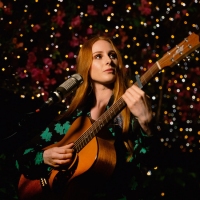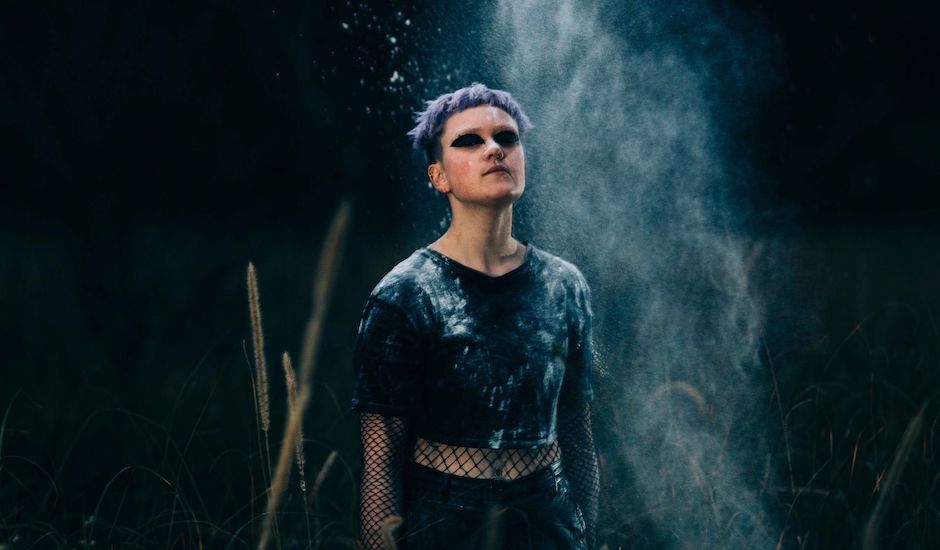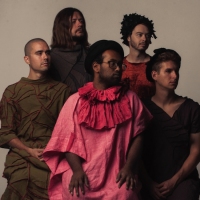 Premiere: Vera Blue unveils the video for Lie To Me's acoustic, stripped-back versionAfter performing a show with a string section over the weekend, the Australian favourite now strips things right back to their most intimate and aching.
Premiere: Vera Blue unveils the video for Lie To Me's acoustic, stripped-back versionAfter performing a show with a string section over the weekend, the Australian favourite now strips things right back to their most intimate and aching.

Album Walkthrough: Lupa J breaks down the intimate rush of To Breathe Underwater
After encapsulating their charm with a debut album last year, Lupa J now unveils a second one - and goes a little deeper on their being in the process.
Header image by Dean Tirkot.
You no doubt know the story already: artist has break-out 2019, everything is looking great, then bam! COVID. No touring. No collaboration. No festivals. It's something that rings particularly true - maybe even more-so than for most - for the Sydney-based musician Lupa J, who after the runaway success of their thrashing, techno-pop-fuelled debut album Swallow Me Whole last year, picked themselves up and moved to Melbourne, where they immersed themselves in the city's queer-led creative culture, and the freedom and catharticism that comes alongside it.
Originally, the plan was for Lupa to spend the year refining their sound and exploring new avenues, with the hopes of an EP showing this evolution and experimentation at some point towards the year's end. Instead, Lupa was forced to fly back to Sydney and in turn, was removed the influence and inspiration they were gaining from their Melbourne surroundings; clanging away at new music under the depths of isolation, where things like external collaboration and creative explorations were reduced to near-nothing.
The end result of that time comes in the form of To Breathe Underwater, an eight-strong collection of tracks that explores the inner workings of Lupa J's mind both personally and musically, moving things forward - albeit in a way that was no doubt not originally planned - but with a heightened sense of reflection and introspectiveness. In a way, To Breathe Underwater is an apt title that sums everything up - one that works in meaning for Lupa (which they'll explain shortly), but one that also suggests claustrophobia and heavy layering, as brought to life through the music's overwhelming pace and its many twists and turns.
The album's first two tracks were written pre-lockdown as Lupa explains, and that shows through their comparative lightness in sound, and how they navigate Lupa J's distinctively rich techno-meets-pop sound with a heavier emphasis on drifting vocals and swaying production. From there, however, the record dives into mayhem; Lupa J capturing the paranoia of the club world they're influenced from with the claustrophobia of coronavirus lockdown, and the emotions and aching that came with being shut away from the world, left to your own introspective thoughts and moments of reflection.
Call Them Up, for example, blares with thick-footed techno and snapping percussion in what feels like a descent into the unknown, encapsulating the rush of club abrasiveness in case you've been longing for it in the past few months. Songs like To Become and Know Your Name follow suit, the latter being somewhat of a middle-ground between the record's abrasive twists and its lighter, more vocal-led moments, where songs like Obliterate and This Suburb move with the intimacy that takes you into Lupa's life.
This Suburb is a particularly potent cut from the record, contrasting these busts of distorted, aching vocal yells with the darkness that stems from Lupa evaluating their relationship, and the emotional complexities that underpin love at its most troubled. It's a song that encapsulates the album's second half, which veers away from the contrastingly light beginning and instead, takes a step into what's become a defining - but no doubt strange - time for Lupa, exploring journeys though queerness and self-acceptance alongside things like the aforementioned relationship, and greater senses of being.
It's a twisted, distorted, brilliant album that really emphasises the peaks of Lupa in a way that their debut album kind-of glossed over, carving an experimental, evolutionary lane that pedestals Lupa J as one of Australia's most adventurous. You can take a dive into the full record below, but underneath that, be sure to read the album's track-by-track walkthrough, which analyses and breaks down its creation, sound and themes one song at a time.
At the end of last year, I left my hometown in Sydney with the hopes of integrating myself into the melting pot that is Melbourne’s live music and club culture. Already a regular at the infamous Le Fag and other underground queer-run dance parties (I would fly down at least every two months & go clubbing with my friends), I had glorious plans to develop my dance music production skills, teach myself how to DJ, and aim to play at such events myself.
I decided that instead of immediately following up my debut album Swallow Me Whole with another full-length record, I’d take this year to develop my sound, and attempt to unite industrial techno with auto-tuned pop in the format of an EP - with the idea that a shorter record would be less high-pressure while experimenting with different genres.
Obviously, this year did not go to plan for anyone. I only got 5 months into my new life in Melbourne before COVID hit Australia, and had to make a snap decision to uproot and come back to Sydney to be with my loved ones for the (un)foreseeable future. In lockdown, with no clubs, no friends, no dancing, I ended up making a longer and more introspective album than I anticipated. In the anxious uncertainty of the pandemic I found myself reflecting on my problematically needy tendencies in relationships; uncomfortable with how much of myself I often sacrifice for the sake of closeness with another person.
As I pieced this album together I realised I had a lot to write about that struggle within myself. I named it To Breathe Underwater because water was continually coming up in my lyrics as an unconscious metaphor for my desire to become completely encompassed in another - being submerged by water as this beautiful but potentially dangerous experience; breathing within it an impossible dream.
1. Supermarket Riots
Supermarket Riots was the second track I wrote for the record. I was angry with myself for feeling needy and un-together since moving cities, and I knew I wanted to write about that - and then COVID hit Australia. The streets emptied, supermarkets were literally riots in some places, & I was in a long-distance relationship with the possibility of the state borders that separated us closing. This track is a chaotic picture of the headspace I was in back then, feeling panicked but simultaneously frustrated with how codependent it all made me.
2. Perfect Weekend
This track was actually the first I wrote for the album - go figure, I wrote it after a bad night out pre-COVID times. I had this scary experience with a bad psychedelic trip, and I wrote this pretty soon after - I think that’s why it’s such a depleted, exhausted sounding slow burner. This particularly awful weekend kind of became a snapshot of a confused, helpless point in time for me. I tried to meld the production around that sickly feeling of being out of it & not knowing where you are or what’s going on.
3. Call Them Up
Once I returned to Sydney and Australia went into lockdown, I knuckled down and decided I’d try and smash out the rest of the album in all the newfound free time I had. This track was the first one I made in that space. I guess you can hear from how dark it is what those first few weeks of lockdown were like for me, without a busy life to distract me from anything - I was suddenly confronted with all this sadness I had about the way a past relationship had ended, and my own part in it. Writing lyrics about it felt strange and so I just bashed out this techno track instead. It was kind of a fun exercise for myself in this track to see if I could recreate a classic booming techno kick - I feel like I learned a lot about production making it.
4. Obliterate
This song actually went through quite a few versions - which I think was a good exercise for me, because most of my songs tend to stick very closely to the form I first write them in. It originally started out slower, and a lot sadder… but after taking breaks and coming back to it a few times I realised it never seemed to hit as hard as I wanted it to. I sped it up and wrote those really ‘boppy’ verse chords and melodies, and then the lyrics kind of became a lot more cynical and weird. (‘Now watch me fall apart / I’ve got it down like it’s an art’ … ‘I had a dream you were gonna die / and you were just telling me I’d be fine’).
I’ve never poked fun at myself so much as in this song, I think I was just really fed up with myself and my problematic patterns by the time I was making the third version of it.
5. To Become
I was making To Become while simultaneously making Obliterate and some of the other pop tracks - whenever I got stuck on them and needed a break from lyric writing & pop structures I’d work on this. I had no idea where I was going with it when I started, which made it really fun to make - it evolves through so many different spaces. I started by jamming on a few sounds and beats, and lined a few pieces as ‘bits’ to get to later in the track. Whenever I thought I’d reached peak intensity I was like wait, no - it can go HARDER! and then made another section.
Thematically this one kind of introduces material I touch on more in the second half of the album - a letting go of constructs of gender I’d imposed onto myself for the sake of past relationships. There aren’t many lyrics - it’s a difficult topic to articulate my feelings on, so it just naturally felt more cathartic to make a techno track. I sampled some voices from wildly different contexts (gold star if you can figure out what they are) and put them together to impose my own meaning onto them, a fun exercise for myself I started doing in Swallow Me Whole.
6. Know Your Name
I wrote this one right after Call Them Up, also during my super reflective phase in the first lockdown. I was like: ok check, I’ve made a techno track, now can I make a techno track with pop vocals? I don’t know if it’s neatly pop OR techno now, somewhere in the middle I guess.
Lyrically this one follows on from To Become, looking more closely at my past struggles accepting myself & breaking free from normative ideals of gender, often as a result of expectations I had on myself to appease others. While writing this album I came out publicly as non-binary / genderqueer, and I was really interrogating myself on it all when I made this song.
7. This Suburb
This may be the saddest song I’ve ever written. Which is strange because it sounds really light for the first three quarters - but it still catches me off guard sometimes and makes me teary. I think it treads that fine line of being heartbroken but sounding beautiful / almost happy because I wrote it while realising that a relationship may not be working whilst still being deeply entrenched in it, and loving so much of it.
I had all this fantastical imagery in my head of my body becoming ‘one’ with a place, almost like a singular unified organism - like I was so enmeshed in a way of living that to rip myself from it would be ripping out a part of myself.
8. You
You is the only real calm, warm song on the album, and probably the only true ‘love’ song I’ve ever written. It took the longest to finish because I really wanted to get it right, and for it to be as honest as possible. I kept coming back to it between finishing the other songs; it required me to be in a certain headspace - one of acceptance, which isn’t always easy. While the rest of the album interrogates my struggles and bad patterns in trying to connect with people, this song looks back over a relationship and the ways in which it helped me grow, and gave me space to find myself. It only made sense to be put at the end.
Follow Lupa J: FACEBOOK
 Premiere: Vera Blue unveils the video for Lie To Me's acoustic, stripped-back versionAfter performing a show with a string section over the weekend, the Australian favourite now strips things right back to their most intimate and aching.
Premiere: Vera Blue unveils the video for Lie To Me's acoustic, stripped-back versionAfter performing a show with a string section over the weekend, the Australian favourite now strips things right back to their most intimate and aching.
 EP Walkthrough: Perth favourites Grievous Bodily Calm detail their new EP, ArcBuilt from a hot bed of experimentation and improvisation, the group's three-track new release is rich with evolution.
EP Walkthrough: Perth favourites Grievous Bodily Calm detail their new EP, ArcBuilt from a hot bed of experimentation and improvisation, the group's three-track new release is rich with evolution.